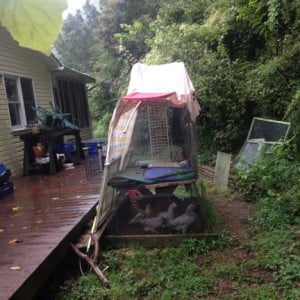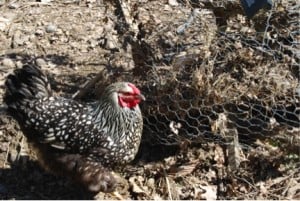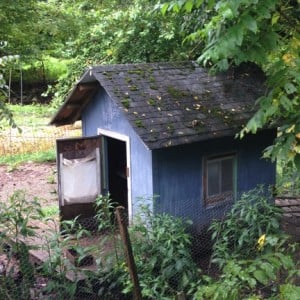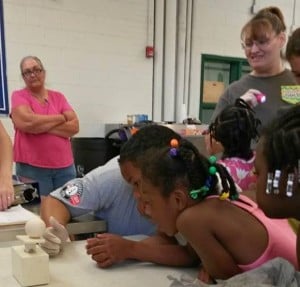Chicken Summer
Several gardeners at both our Lincoln and Logan sites have raised chickens over the last two years and the egg harvest has been a bright spot, for the most part, surviving the two “hundred year” floods we experienced this spring and summer. They have also been one of the better examples of gardeners supporting each other—raising chicks while fellow gardeners took the time to build secure pens, and with one of our gardeners hatching and selling chicks as part of his marketing effort
Our difficult flooding seasons (over 300 home and secondary road bridges are out in the counties we serve and county agents are still trying to file claims with FEMA) did have some casualties: in the April flood, one Lincoln gardener relocated her chickens to the high ground of her barn but in their anxiety over the storm the relocated to the low ground of their coop and drowned.

The need for high water shelter leads required creative materals (1 picnic table, 2 shower curtains and assorted other scraps)
Having so much of our prime garden and chicken grazing land at risk has led to some creative solutions such as another gardeners temporary shelter for younger chicks made from chicken wire, a picnic table, and several decommissioned shower curtains. So far no cats, fox, nor crabbier older hens have breached their defense.
Our sister after school programs have also gotten in the act with summer programs incubating chicken, turkey and goose eggs. Their summer breakfast and lunch scraps have kept local hens happily laying through a stormy summer.
Our learning curve has included sorting out when new chicks can be added to older hens, where to find bands to distinguish generations of hens, what scraps not to give chickens (onions, garlic and avocado. Leftover scrambled eggs are not a health hazard but remain a little too creepy to pass back to their source).
While most of our gardeners lean toward hen only roosts, the new batch of chicks have included a few emerging roosters. While our gardeners scrupulously do not name their chickens in order to avoid growing too attached, the question remains: barnyard fixture or Sunday dinner? As their crowing grows stronger (and more erratic overnight) the choice may become easy.





Leave A Comment